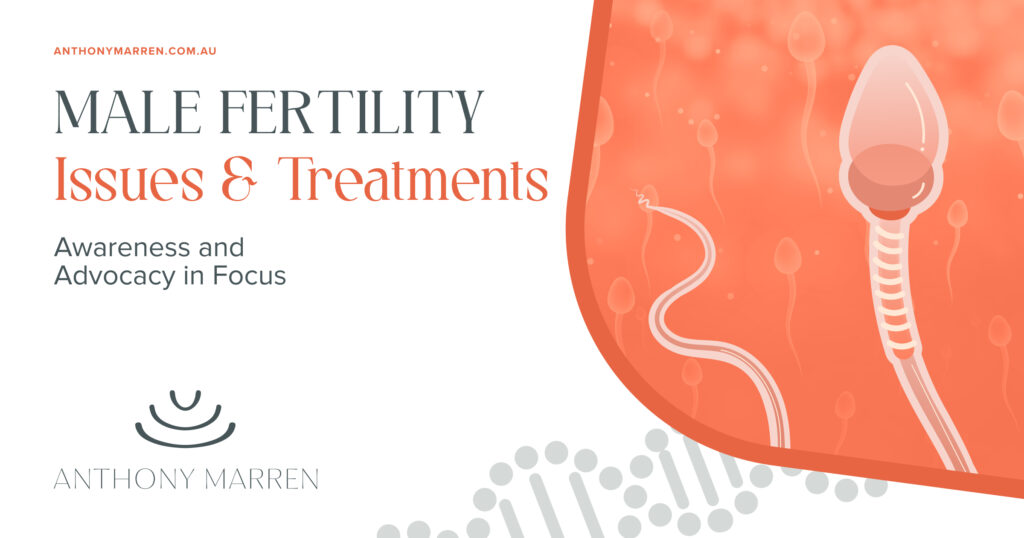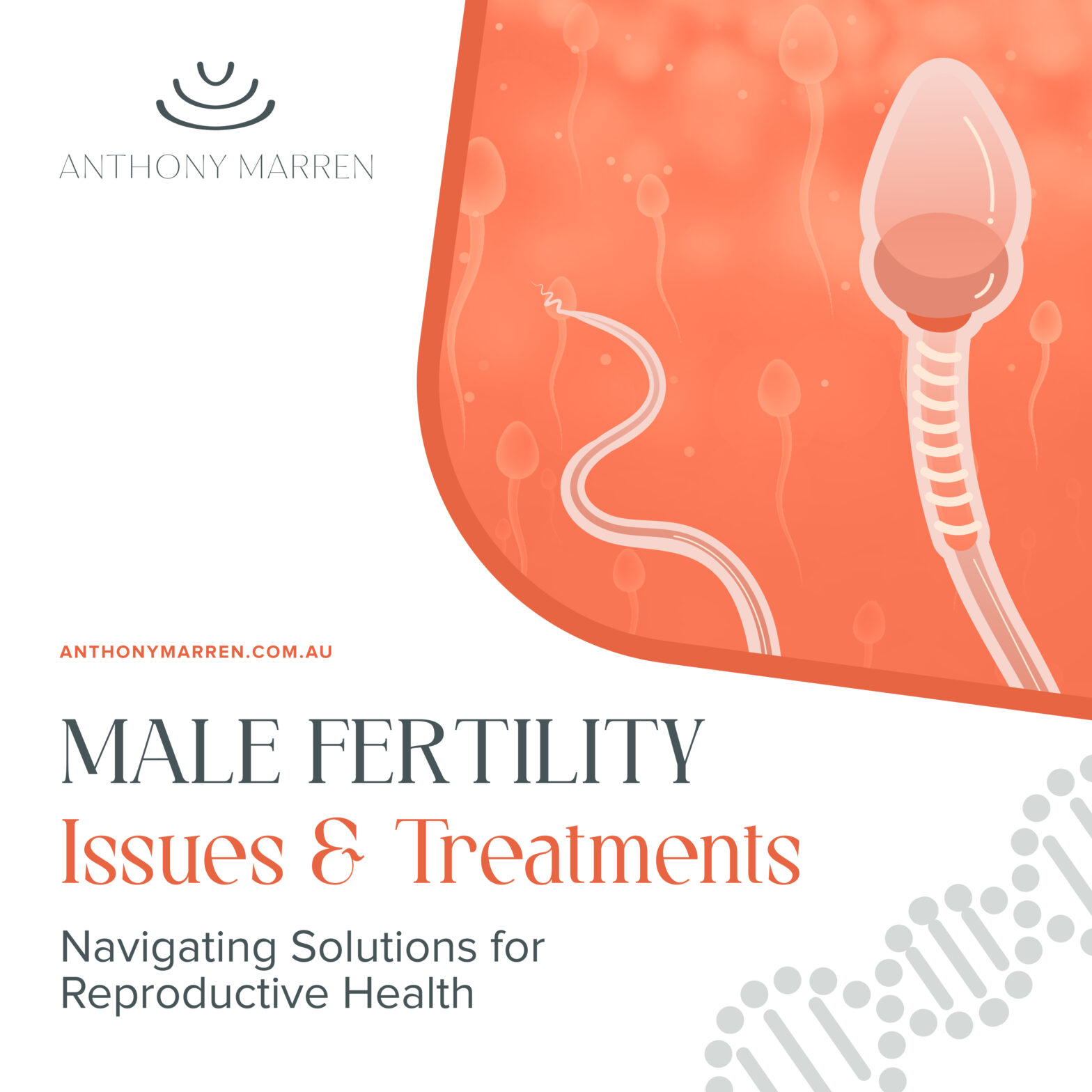Male fertility issues are a significant concern for many couples facing difficulties in conceiving. In the United States, they account for approximately one-third of infertility cases. Infertility can be a distressing topic, but understanding the causes and treatments available is essential for those looking to start or grow their family. A visit to a doctor specialising in male reproductive health is the first step in diagnosing the cause of infertility. Through a comprehensive analysis, including medical history and various tests, healthcare professionals can identify specific fertility issues.
Common male fertility problems include low sperm count, poor sperm motility, and abnormal sperm morphology. Other issues could be genetic factors, hormonal imbalances, or anatomical problems. Once a diagnosis is established, treatment options can be tailored to the individual’s unique situation. Therapies may range from medication and surgery to assistive reproductive technologies such as in vitro fertilisation (IVF). Besides these medical interventions, lifestyle modifications can play a significant role in improving male reproductive health.
Lifestyle factors, such as diet, exercise, and stress management, are areas where changes can support fertility treatment outcomes. While male infertility can be challenging, resources and communities are available to provide support and information for affected individuals and couples.
Key Takeaways
- Male fertility issues contribute to a third of infertility cases, necessitating professional diagnosis and treatment.
- Treatments for male infertility range from medication to surgical interventions and assisted reproductive technologies.
- Lifestyle modifications can support the effectiveness of medical fertility treatments.

Understanding Male Infertility
Male fertility relies on the healthy production and function of sperm, a complex process that can be disrupted by various factors.
The Reproductive System and Sperm Health
The male reproductive system is designed for the production, storage, and delivery of sperm. Sperm are produced in the testicles, matured in the epididymis, and propelled through the seminal vesicles. To fertilise an egg, sperm must be adequately shaped, motile, and numerous. The hormone testosterone plays a crucial role in sperm production. Sperm health can be affected by factors such as temperature, with the testicles being external to maintain an optimal environment for sperm production.
Risk Factors and Causes of Infertility
Several factors can disrupt male reproductive processes resulting in infertility. These include:
- Lifestyle factors: Smoking, excessive alcohol consumption, and illicit drug use can have negative impacts.
- Medical conditions: Diseases like erectile dysfunction and varicocele can hinder fertility.
- Genetic factors: Certain genetic conditions may impact sperm production and function.
- Environmental factors: Overexposure to certain chemicals and radiation can damage sperm.
- Psychological stress: Can affect hormone levels and subsequently, sperm health.
Below is a table summarising the mentioned risk factors and their typical impacts:
| Risk Factor | Impact on Fertility |
| Smoking | Decreases both sperm count and motility. |
| Alcohol | Can lead to reduced testosterone and impaired sperm. |
| Drugs | Some may interfere with hormone production. |
| Stress | Can negatively affect hormonal balance and sperm production. |
| Erectile Dysfunction | May prevent effective delivery of sperm. |
| Varicocele | Can increase testicular temperature, affecting sperm. |
| Genetics | Genetic abnormalities can lead to poor sperm quality. |
Diagnosing Male Fertility Problems
The process of diagnosing male fertility issues generally begins with a thorough evaluation and progressively involves more specific tests to determine the underlying cause.
Initial Evaluation and Medical History
An initial evaluation typically involves a detailed medical history and a physical examination. During this medical history, the specialist will inquire about any past health issues, surgeries, or infertility in the family. They will also ask about lifestyle factors that could impact fertility. The physical examination may detect the presence of varicoceles or other anatomical abnormalities that could affect sperm production or delivery.
Semen Analysis and Laboratory Tests
Semen analysis is fundamental in diagnosing male fertility. This test assesses:
- Sperm count: the concentration of sperm in the semen.
- Motility: the ability of sperm to move effectively.
- Morphology: the shape and structure of the sperm.
Abnormalities in these parameters can indicate potential fertility problems. In cases where semen analysis results are abnormal, further laboratory tests may be recommended, such as:
- Hormone testing: to detect hormone imbalances that could affect sperm production.
- Post-ejaculation urinalysis: to check for sperm in the urine, which may indicate retrograde ejaculation.
- Genetic testing: may be advised if there’s a suspicion of genetic conditions affecting fertility.
A referral to a urologist who specialises in male reproductive health might be necessary for an in-depth analysis and treatment planning.
Common Male Fertility Issues
Several factors can lead to male fertility complications. Issues such as varicoceles and hormonal imbalances are prevalent, as are concerns that can affect the production and delivery of sperm.
Varicoceles and Testicular Concerns
Varicocele refers to the enlargement of veins within the scrotum, which is similar to varicose veins that can occur in legs. This condition can have a negative impact on sperm production and function. In many cases, it is related to a low sperm count and decreased sperm quality. It can also affect the testicle’s size and potentially lead to complications such as testicular atrophy.
Key points:
- Varicocele can impair sperm quality and quantity
- May cause testicular shrinkage
Erectile dysfunction (ED) is when a male can’t achieve or maintain an erection suitable for intercourse, which can hinder the ability to conceive naturally. While not directly a fertility issue, it effectively becomes one due to its impact on ejaculation.
Hormonal Imbalances and Ejaculatory Issues
Hormonal imbalances can significantly affect male fertility. One particular hormone, testosterone, plays a crucial role in sperm production. Low testosterone levels can be a contributing factor to azoospermia (absence of sperm in semen) and a reduced sperm count.
In terms of ejaculatory issues, retrograde ejaculation occurs when semen enters the bladder instead of emerging through the penis during ejaculation. Conditions such as diabetes, spinal injuries, or surgeries can cause this. On the other hand, anejaculation is the inability to ejaculate at all, and this can be related to psychological or neurological problems.
Key points:
- Hormonal imbalances, particularly low testosterone, can reduce sperm production
- Retrograde ejaculation redirects semen to the bladder, impacting fertility
- Anejaculation refers to the lack of ejaculation, affecting the possibility of natural conception
Ejaculation problems can lead to difficulties in depositing sperm into the vagina, thereby hindering conception. These issues underscore the complexity of male fertility and highlight the importance of comprehensive evaluation and treatment in affected individuals.
Treatment Options for Male Infertility
Male infertility can arise from a myriad of issues, but there are effective treatment options available, encompassing medication, surgery, and assisted reproductive techniques. The following subsections lay out the conventional treatments for male infertility.
Medications and Surgery
To improve sperm production, motility, or function, various medications may be prescribed:
- Hormone treatments and medications
- Antibiotics to clear infections that may interfere with sperm health
Surgery can correct problems or obstructions in the male reproductive tract. Notable surgical interventions include:
- Varicocele repair: To remove enlarged veins that impair sperm quality
- Vasectomy reversal: Restores fertility by reconnecting the vas deferens
- Transurethral resection of the ejaculatory duct (TURED): Opens blocked ejaculatory ducts
- Sperm retrieval procedures: Used when ejaculation is problematic or non-existent
Assisted Reproductive Techniques
For circumstances where medication or surgery is not viable or unsuccessful, assisted reproductive techniques (ART) offer alternative options. ART encompasses:
- Intrauterine insemination (IUI): Placement of sperm directly inside the uterus
- In vitro fertilization (IVF): Eggs and sperm are combined outside the body, and the resulting embryo is implanted into the uterus
- Intracytoplasmic sperm injection (ICSI): A single sperm is injected directly into an egg
Advanced ART procedures can involve detailed sperm selection techniques and testing for genetic issues. They significantly increase the chances of fertilization and allow many couples dealing with male infertility to conceive.
Lifestyle Factors and Support
Male fertility can be significantly influenced by lifestyle choices. Focusing on a healthy lifestyle, including diet and activities, is pivotal in improving sperm quality. Support networks and alternatives play a crucial role when dealing with fertility issues.
Improving Sperm Quality through Lifestyle
Diet: A diet rich in zinc, vitamin C, and vitamin E can be beneficial for sperm production and quality. Including foods such as:
- Zinc: Oysters, beef, and pumpkin seeds.
- Vitamin C: Citrus fruits, tomatoes, and capsicum.
- Vitamin E: Almonds, spinach, and sweet potatoes.
Alcohol and Smoking: Minimising alcohol consumption and avoiding smoking can greatly improve male fertility. Both habits are linked to decreased sperm count and quality.
Weight: Maintaining a healthy weight is essential. Being overweight can impact hormone levels and subsequently affect the reproductive organs and the ability to transport sperm effectively.
Anabolic Steroids: Avoiding the use of anabolic steroids is crucial, as they can impair sperm production and lead to long-term fertility issues.
Exercise: Regular physical activity is beneficial but over-training should be avoided. Balance is key in promoting a healthy lifestyle while trying to conceive.
Emotional Support and Alternatives
Support Networks: It’s important for individuals to seek emotional support through counselling, peer support groups, or talking with a healthcare provider.
- Counselling: Can assist with coping strategies and stress management.
- Support Groups: Provide shared experiences and insights from those in similar situations.
Alternatives: When facing fertility challenges, one might consider alternatives such as adoption or clinical trails for novel treatments.
Prevention: Education and training regarding prevention and awareness can further assist individuals in understanding fertility issues.
Frequently Asked Questions
When exploring male fertility issues, it is crucial to understand common concerns and the available treatments.
What are the primary causes of infertility in men?
The main causes of male infertility include low sperm production, abnormal sperm function, blockages that prevent sperm delivery, and lifestyle factors such as stress, obesity, and smoking which can impact sperm quality.
How can a man ascertain if he is infertile?
To determine infertility, a man can undergo a semen analysis, which assesses sperm count, movement, and morphology. If results are abnormal, further testing may be recommended by a healthcare professional.
What treatments are available for men with no sperm count?
For men with no sperm count, known as azoospermia, treatment options may include surgical retrieval of sperm if blockage or production issues are present, or the use of donor sperm for assisted reproductive technologies (ART) like IVF.
Are hormonal treatments effective for male infertility?
Hormonal treatments can be effective for male infertility caused by hormonal imbalances. These treatments aim to restore the natural balance of testosterone and other hormones to improve sperm production.
Can treatments fully rectify fertility issues in men?
While some treatments can significantly improve fertility in men, they may not fully rectify all fertility issues. Success varies depending on the underlying cause and the chosen treatment method.
What are the most prominent types of male infertility?
The most prominent types of male infertility include obstructive azoospermia, non-obstructive azoospermia, oligospermia (low sperm count), and asthenozoospermia (poor sperm motility). Each type requires a specific approach to treatment.


